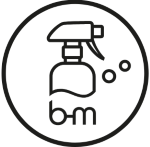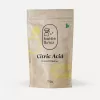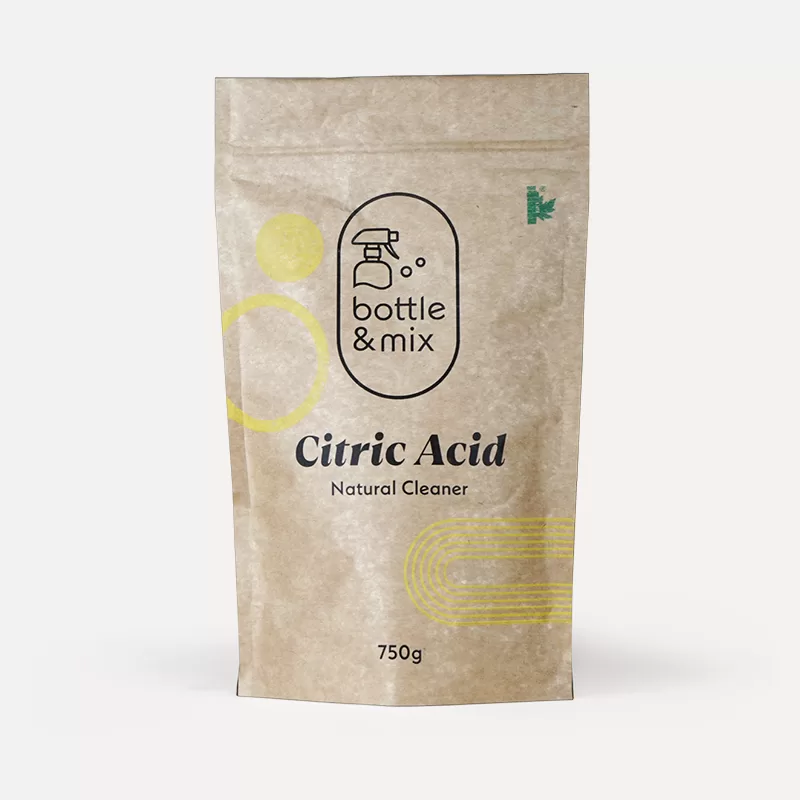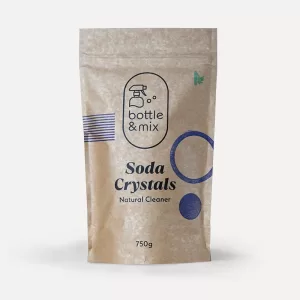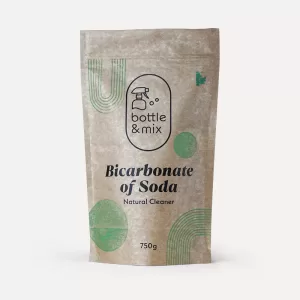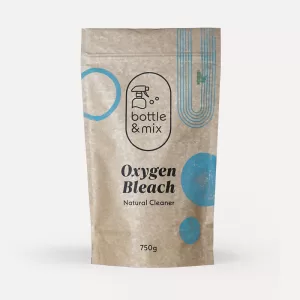Create a powerful Multipurpose Cleaner: Combine 1 tbsp of Citric Acid with 250 ml of distilled or previously boiled and slightly cooled water in a container until fully dissolved. Pour the mixture into a Trigger Spray Bottle using a funnel. Optionally add 5-10 drops of your favourite Essential Oil (remember, if you’re using it, always add it last). Make sure to label your cleaning solution with a waterproof label. Shake well and spray onto surface and allow it to work for ten minutes. Wipe clean and dry with a Microfibre Cloth for a streak-free result. Use leftovers to descale your toilet.
 Disinfect:
Disinfect:
Use the multipurpose solution from above to disinfect surface areas in your home like kitchen counters, tables, or other areas where you eat and prepare food. Use it to sanitize wooden cutting boards and utensils. Wash your cutting boards as usual, then coat the surface with the Citric Acid solution and allow it to work for 10 minutes. Rinse the surfaces with hot water and dry well.
 Bathroom:
Bathroom:
Spray the Citric Acid multipurpose solution from above on bathroom tiles, fibreglass shower stalls or shower doors to cut through soap scum. Let it work for at least 10-30 minutes, then wipe and clean as usual.
 Mould and Mildew:
Mould and Mildew:
Not only does this Citric Acid cleaning solution remove hard water stains with ease, it will clear up streaks, scum, mould and mildew too. Citric Acid cleaners kill the common bathroom mould, Aspergillus brasillensis, in minutes. To fight mould and mildew spray the solution over the affected area, allow the solution to work for 10- 20 minutes and then wipe off.
 Stainless Steel:
Stainless Steel:
Citric Acid is highly effective in cleaning rust, limescale, and other deposits from stainless steel fixtures, equipment and surfaces in your home. Apply the Citric Acid solution directly onto the stainless steel and allow it to work for several minutes. Rinse it with water, then, use a Microfibre Glass Cloth to polish the surface. Repeat if necessary.
 Washing machine and Dishwasher:
Washing machine and Dishwasher:
Citric Acid breaks down hard water deposits and removes build-up. For dishwashers and washing machines: Put 7-8 tablespoons of Citric Acid directly into the empty appliance and select a medium-temperature rinse cycle (maximum 40 degrees).
 Stains:
Stains:
Shirts and blouses often still have yellowish stains on the collar or in the armpits. Remove sweat and deodorant stains with an effective treatment of a Citric Acid water solution: Simply soak the clothes for a few hours (10-15 grams of acid per litre of water). Machine wash as usual. Keep in mind, that this technique is best suited for white clothing since Citric Acid acts as a mild bleach, and it’s not recommended for delicate fabrics.
These are just some of the very many applications for Citric Acid! Check out our Recipe page for even more ideas!
Whilst Citric Acid is a natural cleaning wonder there are some things that should not be cleaned with it because of its corrosive properties.
 Natural Stone:
Natural Stone:
Citric Acid can etch or pit stone, granite, marble, and quartz surfaces so it should never be used to clean natural stone surfaces. The enzymes in Citric Acid will break down the delicate surface layer of these materials, corroding slowly over time.
 Sealed Wood:
Sealed Wood:
Citric Acid can degrade the wax sealant, causing the protective layer to break down and leaving a cloudy appearance. It also makes the surface more susceptible to further damage.
 Electronic Screens:
Electronic Screens:
Phones, laptops, tablets, televisions, etc., all come with a protective coating to reduce smudges. Citric Acid can break down this layer, revealing the layers meant to be protected.
Store Citric Acid in a labelled airtight container in a cool and dry place, out of reach of kids and pets. Get a container with a tight seal, such as our glass jars. Not only will this keep the Citric Acid protected and maximize its shelf life, but it also makes it easier to scoop out when needed for cleaning.
Whilst Citric Acid is a very environmentally friendly and safe natural cleaning ingredient, it is important to keep in mind that Citric Acid is still a chemical. As such the powder can still cause damage and irritation if handled incorrectly.
Breathing in Citric Acid can cause upper respiratory symptoms. These include a sore throat, a cough, and/or shortness of breath. To help prevent any respiratory upset, measure out the Citric Acid powder in a well-ventilated area.
Citric Acid can also irritate your eyes. If you get Citric Acid in your eye, it can cause irritation, runny eyes, redness, and swelling. Take care not to spill the powder, or rub your eyes before washing your hands. Prolonged contact with the skin can also cause irritation, redness, and swelling. It’s recommended to wear rubber gloves if using a lot of Citric Acid-based cleaning products, or if you have particularly sensitive skin.
Citric Acid should also be kept away from curious pets and/or children. Whilst Citric Acid is found in food items in a small quantity as a preservative, if large amounts of Citric Acid are ingested then it could cause nausea, vomiting, and diarrhoea.
